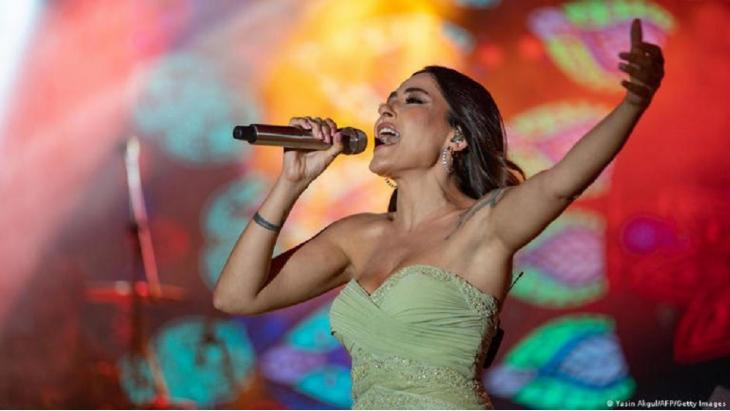“Pleasure, healing and art” – that’s what the organisers of the “Aromatherapy” festival in the northwestern Turkish province of Balikesir promised, and they delivered: for three days, visitors tried healthy delicacies from the region, learnt more about the healing power of nature in seminars, and partied the night away at concerts. Only the highlight, the final concert by famous Turkish pop singer Hande Yener, was suddenly cancelled.
Prior to the festival, Islamist and ultra-nationalist groups had been up in arms against her on the Internet: the 50-year-old was “immoral”, how could she perform there? Yener, with her revealing stage outfits and her support for the LGBTQ community, has long been a hate figure in such circles.
Their aim, however, was to prevent not only the concert, but also the festival. In a statement, 26 pro-government Islamist and ultra-nationalist associations and foundations called on the authorities to ban “festivals of this kind” altogether. They claimed that such cultural events incited people to “immoral” relationships, moral depravity, alcohol and drug consumption, and rebellion and sedition.

Accusations of “moral depravity”: Islamist and ultra-nationalist circles prevented singer Hande Yener from performing at the “Aromatherapy” festival in the north-western Turkish province of Balikesir. Prior to the festival, Islamist and ultra-nationalist groups had been up in arms against her on the Internet: the 50-year-old was “immoral”, how could she perform there? Yener, with her revealing stage outfits and her support for the LGBTQ community, has long been a hate figure in such circles
Many artists face hostility
Yener, who had previously been reticent about criticising the government, confirmed that her concert had been banned following pressure from Islamist and ultra-nationalist groups. In a post on her social media channels, she wrote that she would continue to perform on stage with all her energy and love. Alluding to how deeply the cancellation disappointed and hurt her, she added: “We will heal each other.
“Concerts by numerous other artists had been cancelled prior to Yener’s show. According to the Turkish Observatory for Artistic Freedom SÖZ, such cancellations have increased, especially over the last year. During the first six months of this year alone, 27 artists have been victims of smear campaigns, threats or attacks, and more than 15 events have been banned. According to SÖZ, 37 investigations and lawsuits are currently underway against artists. During the same period, Cihan Aymaz, a street musician, was murdered.
Female artists are more often affected by hostility than their male colleagues. LGBTQ artists who have come out are also increasingly the victims of ruthless smear campaigns.
Take popular singer and songwriter Mabel Matiz. He has been the target of massive attacks since the release of his video clip “Karakol” (“Police Station”) a year ago. Because of the implied love story between two men, Islamist and nationalist groups declared him a disgrace. His concerts have repeatedly been cancelled, most recently in June.
Most of the cities that ban such events are governed by the ruling AKP. If the local mayor belongs to the opposition, the provincial governor will occasionally intervene, citing alleged security concerns to effect a cancellation.
Women artists and LGBTQ artists targeted more often
Bans of this kind are nothing new in Turkey. In the past, however, they tended to apply to Kurdish artists or theatre groups; over the last twelve months, the circle of artists considered undesirable has grown dramatically.

Targeted by Islamist and ultra-nationalist circles: songwriter Mabel Matiz (right), here with Hande Yener in October 2019. Often the circumstances leading to a cancellation are identical. First, Islamist or ultra-nationalist foundations or brotherhoods start a smear campaign against an event or an artist. Then the artist is personally defamed. They go on to complain about alcohol consumption, women and men partying together, saying such events lead to “moral depravity” and damage the image of the family. Next, organisers and city councils are put under pressure
Many Turks were delighted last year when the pandemic restrictions were lifted – it meant they could finally party together again. Then came the first ban in spring: the well-known Anadolu Festival was not allowed to take place in the university town of Eskisehir. This was followed by further bans and cancellations of festivals and concerts – a trend that continues to this day.
Often the circumstances leading to cancellation are identical. First, Islamist or ultra-nationalist foundations or brotherhoods start a smear campaign against an event or an artist.
Then the artist is personally defamed. They go on to complain about alcohol consumption, women and men partying together, saying such events lead to “moral depravity” and damage the image of the family. Next, organisers and city councils are put under pressure. Official complaints to the police take the pressure up another notch.
Demanding “halal” celebrations
For Burhan Sesen, singer and chairman of the musicians’ association MUYOBIR, these bans and cancellations amount to arbitrary punishment of the music scene, which ever since the pandemic has been suffering from a severe economic crisis. According to him, more than one million people work in the festival industry. Those who call for a ban are putting these people’s future at risk, Sesen criticises.

Concertgoers attend a performance by Melek Mosso: Cangul Ornek, a political scientist from Maltepe University, is critical of such cancellations. She believes that bans on cultural events may encourage cultural bubbles to form within Turkish society. Everyone will end up limiting their contact to those who share the same interests. As a result, young people from different social, political and societal strata in particular will be prevented from coming together and exchanging ideas – almost as if a wall had been erected between them
He also finds it contradictory that on the one hand Turkish President Recep Tayyip Erdogan is seeking rapprochement with the EU, yet on the other pro-government groups are insisting that celebrations must somehow be “halal”. Some groups regularly call for women and men to be seated separately at events, assuming they are not banned altogether.
Sesen is amazed at the arguments being used: “Surely a Muslim young man is not going to stop praying or start drinking alcohol because he goes to a concert.”
Cangul Ornek, a political scientist at Maltepe University, is also critical of such event and concert cancellations. Apparently, the regime has become so far removed from the rule of law that certain elements believe they can influence developments in the country to suit their own agenda.
In their opinion, certain groups have infiltrated state institutions and shared them out among themselves. Meanwhile the government is acting like a coalition of Muslim brotherhoods. These days, Turkey is only secular on paper.
Ornek also believes that bans on cultural events may encourage cultural bubbles to form within Turkish society. She fears everyone will end up limiting their contact to those who share the same interests.
As a result, young people from different social, political and societal strata in particular will be prevented from coming together and exchanging ideas – almost as if a wall had been erected between them.
Elmas Topcu & Aynur Tekin
© Deutsche Welle/Qantara.de 2023



